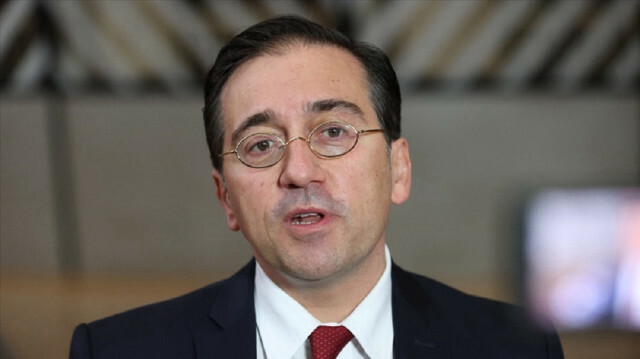
‘Any true step toward de-escalation would be a moment for hope,’ says German foreign minister
The German and Spanish foreign ministers remained hopeful yet skeptical about Russia’s announcement that it is pulling back troops from the border with Ukraine.
“It’s too early to say if this is true. We are still verifying it. But even if it is a small pullback, it would be excellent news because we believe that this is the solution,” said Spain’s Jose Manuel Albares after meeting with his German counterpart in Madrid.
German Foreign Minister Annalena Baerbock agreed, adding that “any true step toward de-escalation would be a moment for hope. What we need now are actions, trust and security.”
Russia announced that some of its troops in the western and southern military districts have started returning to garrisons after completing exercises.
The head of NATO was also cautiously optimistic about Moscow’s latest announcement, but said he wanted to see “a significant and enduring withdrawal of forces.”
At the same time, Baerbock said Russia has been “playing with fire for weeks.”
“This is incredibly dangerous. Dangerous for Russia and dangerous for Europe as a whole,” she said.
Even Spain’s foreign minister, who just last week said he “wasn’t considering war, not even as a hypothesis” in Ukraine, has stepped up his tone.
“We are ready for any scenario. The use of aggression and threats isn’t a way to solve problems in Europe,” he said on Tuesday.
The meeting between the two foreign ministers came just days before they will meet again at the Munich Security Conference. On Monday, they will also coincide in Brussels at the Foreign Affairs Council.
Both leaders sent a message of unity within Europe when it comes to the Ukraine crisis and a commitment to resolving the conflict through diplomacy.
Moscow, according to Ukrainian officials and NATO, has recently amassed more than 100,000 troops near Ukraine, prompting fears that the Kremlin could be planning a military offensive against its ex-Soviet neighbor.
Russia has denied it is preparing to invade and accused Western countries of undermining its security through NATO’s expansion towards its borders.
Russia also issued a list of security demands to the West, including a rollback of troop deployments from some ex-Soviet states, and guarantees that some of those states would not join NATO.
In a written response to those demands, Washington said it is committed to upholding NATO's “open door policy,” while NATO also conveyed the alliance's own reply “in parallel with the United States.”

